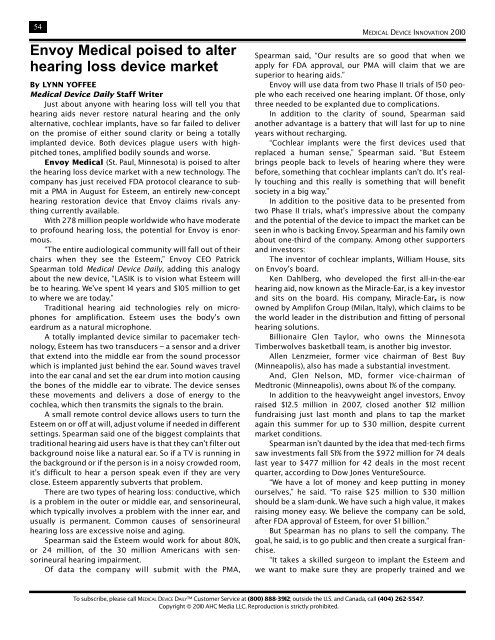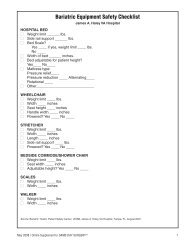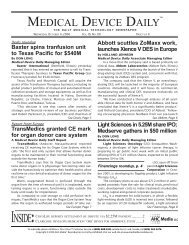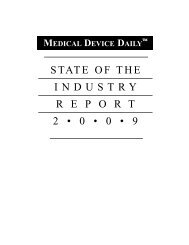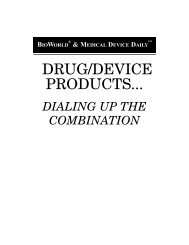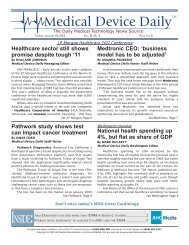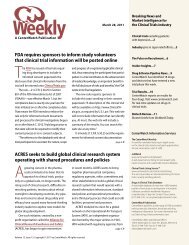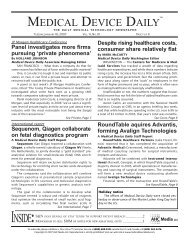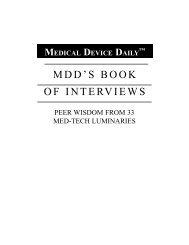MEDICAL DEVICE INNOVATION - Medical Device Daily
MEDICAL DEVICE INNOVATION - Medical Device Daily
MEDICAL DEVICE INNOVATION - Medical Device Daily
Create successful ePaper yourself
Turn your PDF publications into a flip-book with our unique Google optimized e-Paper software.
54<br />
Envoy <strong>Medical</strong> poised to alter<br />
hearing loss device market<br />
By LYNN YOFFEE<br />
<strong>Medical</strong> <strong>Device</strong> <strong>Daily</strong> Staff Writer<br />
Just about anyone with hearing loss will tell you that<br />
hearing aids never restore natural hearing and the only<br />
alternative, cochlear implants, have so far failed to deliver<br />
on the promise of either sound clarity or being a totally<br />
implanted device. Both devices plague users with highpitched<br />
tones, amplified bodily sounds and worse.<br />
Envoy <strong>Medical</strong> (St. Paul, Minnesota) is poised to alter<br />
the hearing loss device market with a new technology. The<br />
company has just received FDA protocol clearance to submit<br />
a PMA in August for Esteem, an entirely new-concept<br />
hearing restoration device that Envoy claims rivals anything<br />
currently available.<br />
With 278 million people worldwide who have moderate<br />
to profound hearing loss, the potential for Envoy is enormous.<br />
“The entire audiological community will fall out of their<br />
chairs when they see the Esteem,” Envoy CEO Patrick<br />
Spearman told <strong>Medical</strong> <strong>Device</strong> <strong>Daily</strong>, adding this analogy<br />
about the new device, “LASIK is to vision what Esteem will<br />
be to hearing. We’ve spent 14 years and $105 million to get<br />
to where we are today.”<br />
Traditional hearing aid technologies rely on microphones<br />
for amplification. Esteem uses the body’s own<br />
eardrum as a natural microphone.<br />
A totally implanted device similar to pacemaker technology,<br />
Esteem has two transducers – a sensor and a driver<br />
that extend into the middle ear from the sound processor<br />
which is implanted just behind the ear. Sound waves travel<br />
into the ear canal and set the ear drum into motion causing<br />
the bones of the middle ear to vibrate. The device senses<br />
these movements and delivers a dose of energy to the<br />
cochlea, which then transmits the signals to the brain.<br />
A small remote control device allows users to turn the<br />
Esteem on or off at will, adjust volume if needed in different<br />
settings. Spearman said one of the biggest complaints that<br />
traditional hearing aid users have is that they can’t filter out<br />
background noise like a natural ear. So if a TV is running in<br />
the background or if the person is in a noisy crowded room,<br />
it’s difficult to hear a person speak even if they are very<br />
close. Esteem apparently subverts that problem.<br />
There are two types of hearing loss: conductive, which<br />
is a problem in the outer or middle ear, and sensorineural,<br />
which typically involves a problem with the inner ear, and<br />
usually is permanent. Common causes of sensorineural<br />
hearing loss are excessive noise and aging.<br />
Spearman said the Esteem would work for about 80%,<br />
or 24 million, of the 30 million Americans with sensorineural<br />
hearing impairment.<br />
Of data the company will submit with the PMA,<br />
<strong>MEDICAL</strong> <strong>DEVICE</strong> <strong>INNOVATION</strong> 2010<br />
Spearman said, “Our results are so good that when we<br />
apply for FDA approval, our PMA will claim that we are<br />
superior to hearing aids.”<br />
Envoy will use data from two Phase II trials of 150 people<br />
who each received one hearing implant. Of those, only<br />
three needed to be explanted due to complications.<br />
In addition to the clarity of sound, Spearman said<br />
another advantage is a battery that will last for up to nine<br />
years without recharging.<br />
“Cochlear implants were the first devices used that<br />
replaced a human sense,” Spearman said. “But Esteem<br />
brings people back to levels of hearing where they were<br />
before, something that cochlear implants can’t do. It’s really<br />
touching and this really is something that will benefit<br />
society in a big way.”<br />
In addition to the positive data to be presented from<br />
two Phase II trials, what’s impressive about the company<br />
and the potential of the device to impact the market can be<br />
seen in who is backing Envoy. Spearman and his family own<br />
about one-third of the company. Among other supporters<br />
and investors:<br />
The inventor of cochlear implants, William House, sits<br />
on Envoy’s board.<br />
Ken Dahlberg, who developed the first all-in-the-ear<br />
hearing aid, now known as the Miracle-Ear, is a key investor<br />
and sits on the board. His company, Miracle-Ear, is now<br />
owned by Amplifon Group (Milan, Italy), which claims to be<br />
the world leader in the distribution and fitting of personal<br />
hearing solutions.<br />
Billionaire Glen Taylor, who owns the Minnesota<br />
Timberwolves basketball team, is another big investor.<br />
Allen Lenzmeier, former vice chairman of Best Buy<br />
(Minneapolis), also has made a substantial investment.<br />
And, Glen Nelson, MD, former vice-chairman of<br />
Medtronic (Minneapolis), owns about 1% of the company.<br />
In addition to the heavyweight angel investors, Envoy<br />
raised $12.5 million in 2007, closed another $12 million<br />
fundraising just last month and plans to tap the market<br />
again this summer for up to $30 million, despite current<br />
market conditions.<br />
Spearman isn’t daunted by the idea that med-tech firms<br />
saw investments fall 51% from the $972 million for 74 deals<br />
last year to $477 million for 42 deals in the most recent<br />
quarter, according to Dow Jones VentureSource.<br />
“We have a lot of money and keep putting in money<br />
ourselves,” he said. “To raise $25 million to $30 million<br />
should be a slam-dunk. We have such a high value, it makes<br />
raising money easy. We believe the company can be sold,<br />
after FDA approval of Esteem, for over $1 billion.”<br />
But Spearman has no plans to sell the company. The<br />
goal, he said, is to go public and then create a surgical franchise.<br />
“It takes a skilled surgeon to implant the Esteem and<br />
we want to make sure they are properly trained and we<br />
To subscribe, please call <strong>MEDICAL</strong> <strong>DEVICE</strong> DAILY Customer Service at (800) 888-3912; outside the U.S. and Canada, call (404) 262-5547.<br />
Copyright © 2010 AHC Media LLC. Reproduction is strictly prohibited.


